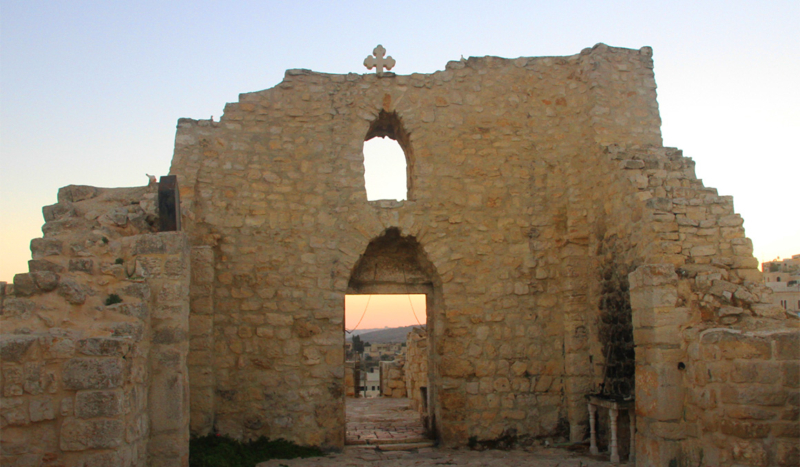
Ruins of the Church of St. George in Taybeh by Ralf Lotys (Sicherlich) / Wikimedia Commons
Church leaders traveled to Taybeh — the last entirely Christian town in the West Bank — and issued an urgent July 14 statement condemning what they called “an intensifying trend of systemic and targeted attacks” against the town’s Christian residents.
“We ask for the prayers, attention, and action of the world, particularly that of Christians globally,” the Council of Patriarchs and Heads of the Churches wrote, urging a response to repeated acts of arson, vandalism, and harassment.
The delegation included Latin Patriarch of Jerusalem Cardinal Pierbattista Pizzaballa and the leaders of the Greek Orthodox and Melkite Greek Catholic churches.
In their statement, the leaders pointed to the July 7 attack in which Israeli settlers “intentionally set fire near the town’s cemetery and the Church of Saint George, which dates back to the 5th century.” They warned that the violence threatens not only Taybeh’s residents but also “the historic and religious heritage of our ancestors and holy sites.”
As CatholicVote reported July 9, Taybeh is historically known as Ephraim, the village where Jesus withdrew before His Passion in John 11:54. It is now home to just 250-300 residents, as most of the town’s previous inhabitants emigrated, Catholic News Agency reported July 11.
“In Taybeh we are also bleeding from emigration,” Father Bashar Fawadleh, the Latin Rite pastor in Taybeh since 2021, told CatholicVote in June. He said 10 families have left since Oct. 7, 2023.
In June, the bishops continued, radical settlers torched several Christian homes and posted signs, including one which read, “‘there is no future for you here.’” They said settlers have also allowed livestock to trample crops on the town’s eastern farmlands, including family-owned olive groves that residents rely on for income.
The bishops criticized the inaction of Israeli police and demanded a full investigation into why officers failed to respond to emergency calls from the community. Local Christians also told CatholicVote in June that Israeli soldiers have frequently stood by during these attacks without intervening.
“The Council of Patriarchs and Heads of Churches calls for these radicals to be held accountable by the Israeli authorities, who facilitate and enable their presence around Taybeh,” the July 14 statement continued. “Even in times of war, sacred places must be protected.”
Nadim Khoury, founder of Taybeh Brewery in the town, told CatholicVote in a July interview that the current West Bank government’s “main idea” is “to transfer Palestinians.” Khoury described its leaders as “extremists who basically believe that the only solution” to conflict in the Holy Land is to erase “the Palestinian presence in Palestine.”
The bishops called on global Church leaders, diplomats, and politicians to stand with Taybeh’s faithful so that “their presence may be secured and that they can live in peace to worship freely, grow crops without danger, and live in a peace that seems to be in far too short of supply.”
With a message of solidarity, the patriarchs emphasized the ancient Christian presence in the region and rejected attempts to drive out the community.
“The Church has had a faithful presence in this region for nearly 2,000 years,” they declared. “We firmly reject this message of exclusion and reaffirm our commitment to a Holy Land that is a mosaic of different faiths, living peacefully together in dignity and safety.”

